
PPT Genre Conventions PowerPoint Presentation, free download ID2537481
Fact Checked What Are Genre Conventions? Genre conventions are the defining elements that categorize and shape a story, guiding audiences through familiar territory. They encompass character archetypes, thematic tropes, and stylistic choices that signal what to expect from a narrative.
Mollie's A2 Media Coursework 2014 7a. What Is Genre?
Genre conventions are story elements such as character archetypes, key events, and settings that are commonly found in a specific genre. These conventions not only define each specific genre but also define the reader's expectations of a story in that genre.
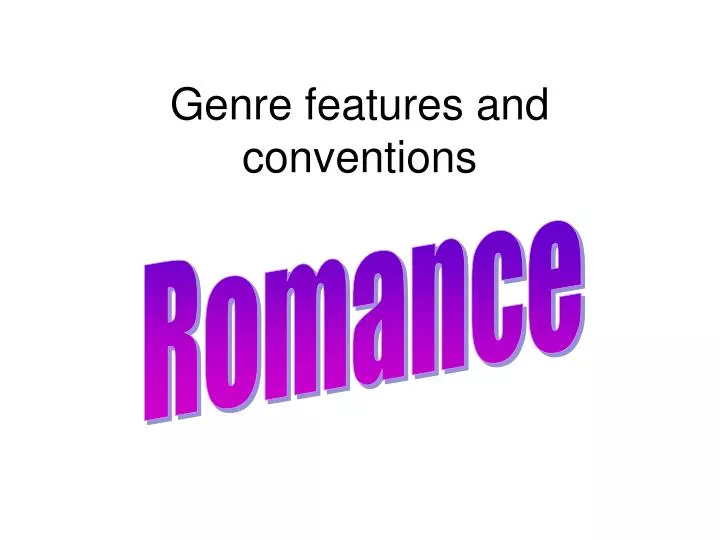
PPT Genre features and conventions PowerPoint Presentation, free download ID6866804
Show that genre conventions are shaped by purpose, culture, and expectation. In personal writing genres, you share experiences of your life, centering them on a specific theme or memory. Unlike an autobiography, which typically extends across an entire lifetime or at least a number of years, memoirs and personal narratives are shaped by a.

PPT Types of Movies PowerPoint Presentation, free download ID2034515
What are genre conventions and why should you use them? Find out today What are genre conventions? Where do they come from? Why are genre conventions important? What's the difference between a genre convention and a trope? Examples by genre. I'm here. When should genre conventions be used? FAQ about genre conventions.

PPT Genre Conventions PowerPoint Presentation, free download ID2537481
1. Genre Refers to a Naming and Categorization Scheme for Sorting Types of Writing "… [L]et me define "genres" as types of writing produced every day in our culture, types of writing that make possible certain kinds of learning and social interaction." (Cooper 1999, p.
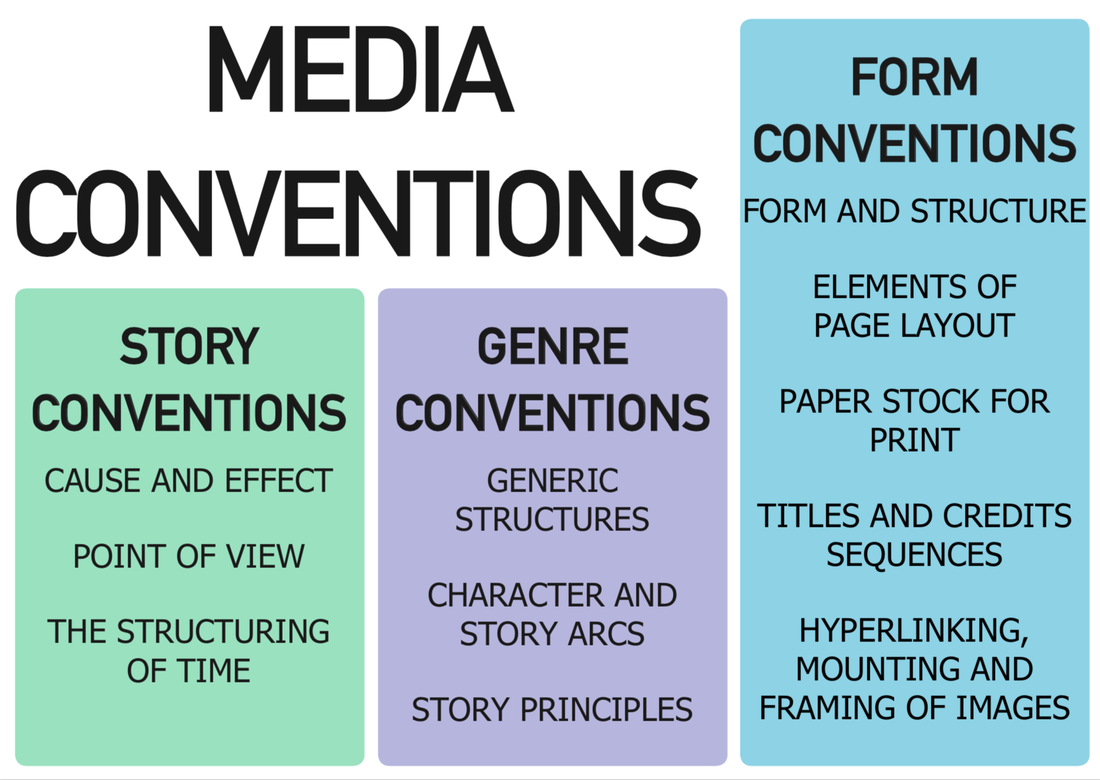
Media Studies Portfolio Genre Examples Gambaran
Characters Plot Theme Genre Characteristics Setting One of the more significant determining factors to a genre is setting. Setting is ultimately the time and place of a story. Setting is either outwardly articulated to us, or discretely suggested to us. It can be suggested by weather, clothing, culture, architecture, etc.

What are generic conventions Types of generic conventions
Genre conventions are elements, themes, topics, tropes, characters, situations, and plot beats that are common in specific genres. Genre conventions are what make certain stories the genre that they are. This is why conventions of a genre are made up of specific elements, as these are used to create and identify the genres in question.
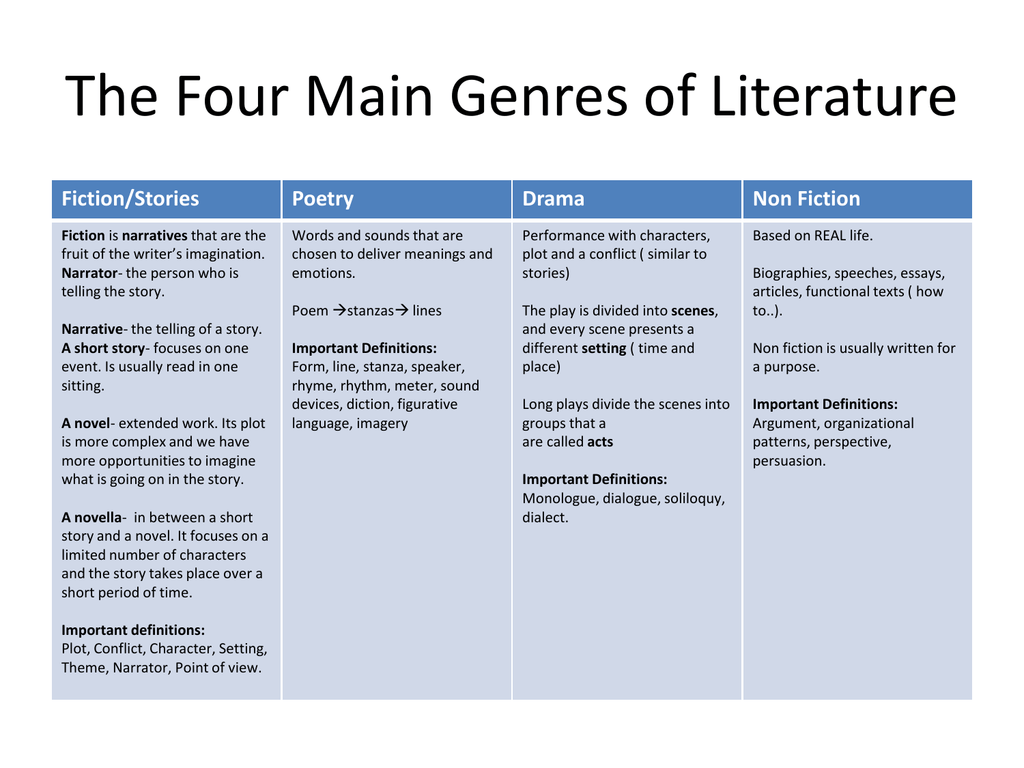
The Four Main Genres of Literature
Pages Codes and conventions Visual codes Audio codes Types of genre Codes and conventions Different media texts have codes and conventions that define their genre and set up audience.

Genre Conventions — The Building Blocks of Genre Storytelling
Identify key rhetorical strategies that authors use to persuade readers. Analyze texts to demonstrate understanding of key rhetorical concepts. Identify genre conventions and explain how they are shaped by purpose, culture, and expectation. Rhetorical analysis is the genre, or type of writing, that examines the way writers and speakers use.
Laura's A2 Media Coursework 2014 Post 7a What is Genre?
A genre convention is any element, including character, plot point, setting, archetypes, and other device that define a reading (or viewing) category. If you've ever searched for a "comedy" on your streaming service, you were depending on the genre conventions to help you find a show to make you laugh. Books work the same way.
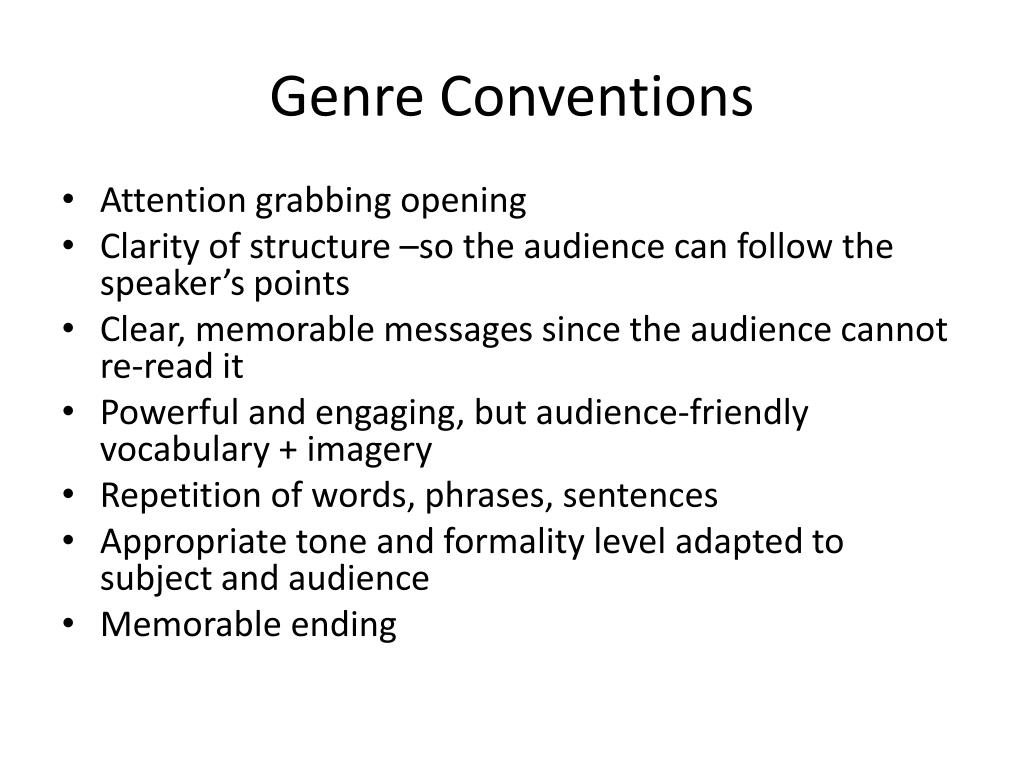
PPT Persuasive Speech Analysis PowerPoint Presentation, free download ID2230157
As a literary device, genre refers to a form, class, or type of literary work. The primary genres in literature are poetry, drama / play, essay, short story, and novel. The term genre is used quite often to denote literary sub-classifications or specific types of literature such as comedy, tragedy, epic poetry, thriller, science fiction.
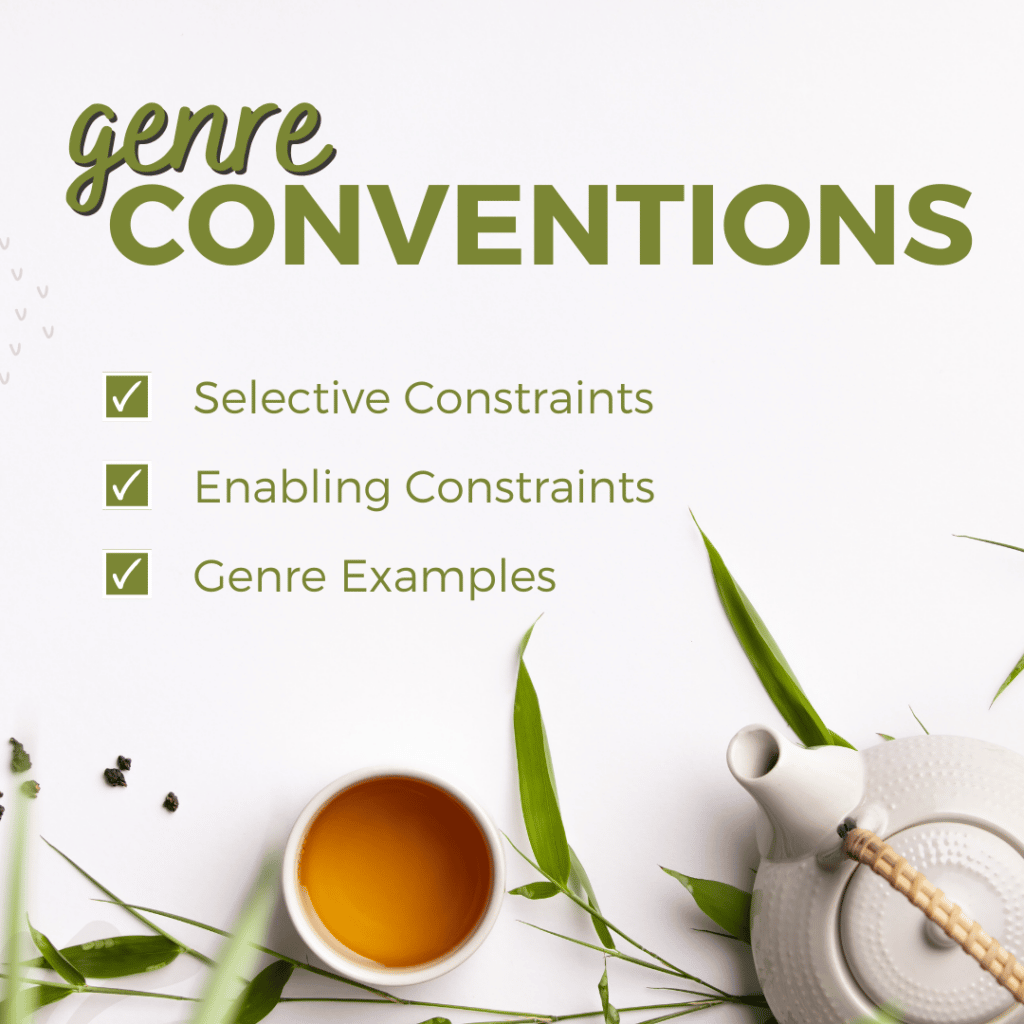
Genre Conventions MustHave Elements of Story
Genre Conventions. Genre conventions are the unwritten rules that define the characteristics and expectations of a particular genre of writing. Whether you are writing a novel, a movie script, or a news article, every genre has its own set of conventions that dictate its tone, structure, themes, and style. By mastering genre conventions, you.
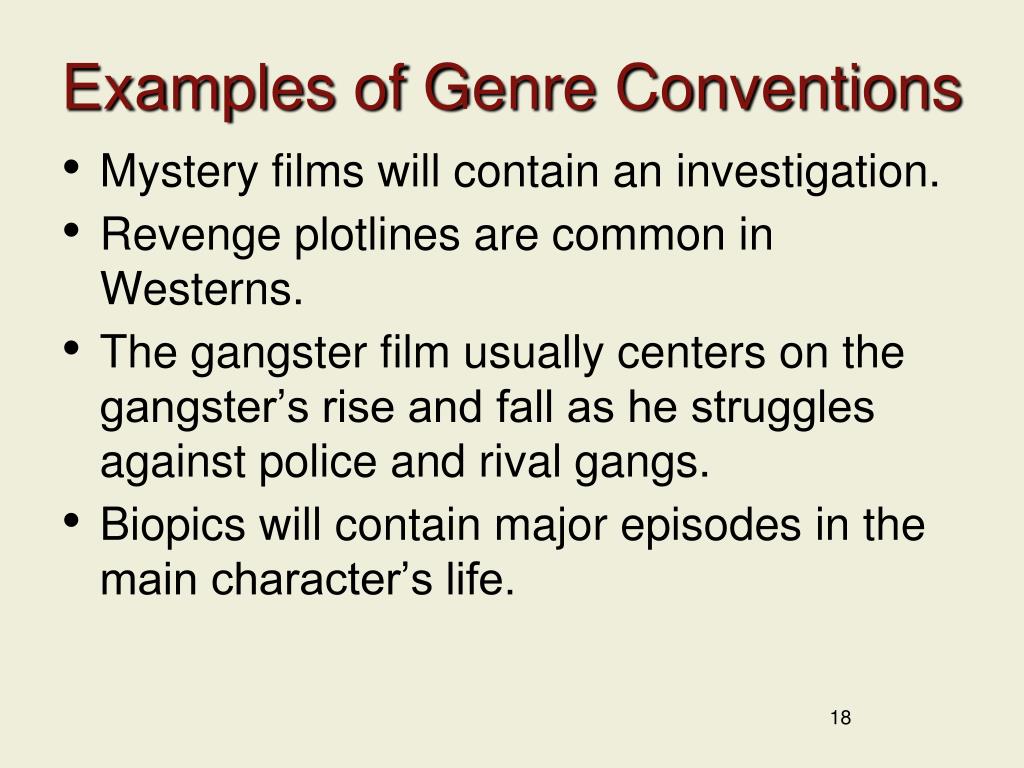
PPT Lecture 11 Genre PowerPoint Presentation, free download ID5478759
Genre conventions help us focus and filter problems and solutions through two broad categories of constraints: selective constraints and enabling constraints. What are Selective Constraints? Selective constraints are elements of the setting, or arena, that help define the problem in a story and put the core need at stake.

What Are Genre Conventions? Give Your Readers What They Want Purple Shelf Club
Option 1. The first example of subverting genre conventions is when you want to blend genres. Let's say you want to write a thriller but with a hint of science fiction. Consider the TV show Fringe. Set on the fringes of reality, this show is classified as science fiction but also includes the FBI. Mixing genres is a great excuse to defy the.
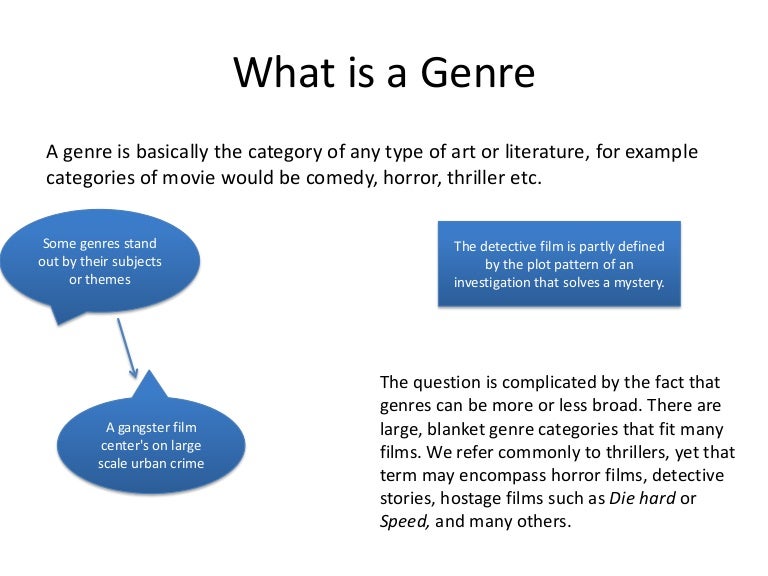
What is a Genre/Codes and Conventions
A simple definition comes from Christine Nord (2018): "Genre conventions are the result of the standardization of communication practices. As certain kinds of text are used repeatedly in certain situations with more or less the same function or functions, these texts acquire conventional forms." (Nord, 2018)

Genre conventions vs. Tropes What's the Difference?
This page contains information on literary timelines and links to what basically are glossaries of literary terms both macro and micro: literary genres, sub-genres, conventions and devices. The Handbook to Literature is almost a must for the personal and professional libraries of English majors.